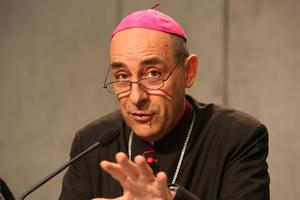Archbishop Fernández Clarifies His Warning Not to Judge the ‘Doctrine of the Holy Father’
The Vatican’s new doctrinal chief says he was referring to the Pope’s unique charism to ‘confirm the brethren in the faith.’

VATICAN CITY — Archbishop Victor Manuel Fernández has responded to criticisms of recent comments he gave to the Register in which he warned bishops not to judge the “doctrine of the Holy Father,” saying he was simply referring to the Lord’s “special assistance” to popes to confirm the brethren in the faith.
In a Sept. 8 interview with the Register, the new prefect of the Dicastery for the Doctrine of the Faith responded to a question on what the Pope meant when he stressed the importance of accepting the “recent magisterium.”
Archbishop Fernández said popes have two charisms: safeguarding the “deposit of faith” and a “living and active gift” that is “at work” only in the person of the Holy Father and no one else.
Regarding that second charism, he continued: “Now, if you tell me that some bishops have a special gift of the Holy Spirit to judge the doctrine of the Holy Father, we will enter into a vicious circle (where anyone can claim to have the true doctrine) and that would be heresy and schism.”
His comments led some to wonder if he was implying that Pope Francis had a doctrine of his own, independent of Church teaching, one that should not be judged or criticized. Such a novelty would not be in keeping with the dogmatic teaching of the Church which has always taught that the Pope, and the bishops in communion with him, are the guardians of the deposit of faith received from the Lord and handed down by the apostles.
In a short clarification sent to the Register Sept. 13, Cardinal-designate Fernández said: “If you follow the argumentation above that sentence [about the Pope having two charisms] you will understand the meaning to be as follows:
“Only to Peter did Jesus Christ promise special assistance to ‘confirm the brethren in the faith.’ Therefore, it seems obvious that no one can say — directly or indirectly — that Francis does not have this assistance and that other, supposedly more orthodox bishops or priests, do have it. No one can attribute to himself this function and this charism that are proper only to the successor of Peter. This is quite obvious to a Catholic, but certainly not to a Protestant.”
Archbishop Fernández has given a slightly fuller explanation of what the term “recent magisterium” means in a new interview published Sept. 14 in La Civiltà Cattolica, in which he again emphasized the second charism he mentioned in the Sept. 8 interview.
Referring to the Pope’s comment on the “recent magisterium,” made in a letter to him to mark his appointment as prefect in early July, Archbishop Fernández said it is “significant” that the Pope “also mentions the recent magisterium, in addition to referring to the perennial teaching.
“This is an important clarification,” he contended, “because it is precisely the recent magisterium that engages in dialogue with the current circumstances of the world and the Church, with its culture and challenges. The magisterium is not a mere ‘deposit,’ but is also a living gift that is active through Francis.
“If the magisterium is also able to enlighten us in our pilgrimage at this moment in history,” he added, “we must allow ourselves to be guided by its recent and current interventions, and there is no doubt that this is tantamount to continuing to drink from that bottomless well that is ever-present and ever-relevant Revelation.”
In comments to InfoVaticana on Sept. 12, Cardinal Gerhard Müller stressed that papal authority is based not on dialogue and engagement with the world, but on a close bond with the Church’s established teaching handed down by the apostles.
"The formal authority of the Pope cannot be separated from the fundamental connection with Holy Scripture, apostolic tradition and the dogmatic decisions of the magisterium that preceded him,” the former prefect of the Dicastery for the Doctrine of the Faith said.
“Otherwise, as Luther misunderstood the papacy, he would put himself in place of God, the sole author of his revealed truth, instead of simply witnessing faithfully, by the authority of Christ, to the revealed faith in an unabridged and unadulterated manner and presenting it authentically to the Church."
- Keywords:
- archbishop victor manuel fernandez


















